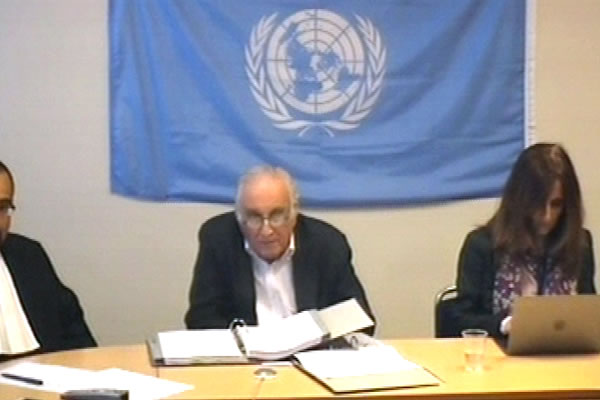Home
LISBON AGREEMENT – CHANCE FOR PEACE OR PLAN TO DESTROY BOSNIA?
Portuguese diplomat Jose Cutileiro has testified at the trial of Ratko Mladic. Cutileiro said that the Lisbon agreement could have saved peace in BH if Alija Izetbegovic had not been persuaded by the Americans to pull out of it. The prosecutor argued that Karadzic had tricked both Cutileiro and the international community. Karadzic acted as if he was all for peace and negotiations while at the same time he devised plans to capture territory and implement ethnic cleansing there, the prosecutor explained. Also, Karadzic boasted in public that the Lisbon agreement had ‘destroyed Bosnia’
 Jose Cutileiro, defence witness at Rako Mladic trial
Jose Cutileiro, defence witness at Rako Mladic trial Portuguese diplomat Jose Cutileiro testified about the Lisbon agreement, which was accepted tentatively by Alija Izetbegovic, Radovan Karadzic and Mate Boban on 18 March 1992. According to Cutileiro, the agreement could have saved the peace in BH if Alija Izetbegovic hadn’t pulled out of it.
Cutileiro was questioned by Mladic’s defense counsel Dragan Ivetic via video link. The witness said that after the Declaration of Principles was signed in March 1992 the Serb side wanted to go on with the negotiations. The Bosnian side, Cutileiro claimed, stalled until Izetbegovic finally withdrew his signature in June 1992. ‘For Serbs and Croats it was yet another demonstration of Izetbegovic’s duplicity as they saw it’, Cutileiro explained. According to Cutileiro, Izetbegovic had the support of ‘the benevolent outsiders who thought they knew the situation better’. Those ‘outsiders’ were the US and its ambassador Warren Zimmerman. It was Zimmerman who encouraged Izetbegovic to reject the tripartite plan, Cutileiro stated, and that ‘encouraged the Bosnian president to fight for a unitary BH’.
Prosecutor Alan Tieger asked the Portuguese diplomat if it had ever occurred to him that Karadzic had ‘simply faked’ his willingness to accept the agreement in order to gain a tactical advantage, whereas Karadzic never really accepted the existence of BH as a state and wanted to annex the Serb territories to Serbia. The prosecutor quoted Momcilo Krajisnik who said at an Assembly session in February 1992 that ‘there is a chance now to keep the Serb nation in a single state that will be part of the Serb empire’. Cutileiro replied that the Serb representatives did not present such opinions during the negotiations; the only exception was Krajisnik who thought that BH should have three votes in the UN and three flags. ‘Karadzic told him to shut up’, Cutileiro noted.
The prosecutor quoted Karadzic’s address at the 39th Assembly session held on 24 and 25 March 1992. Karadzic said that he and other Serb negotiators ‘rejoiced’ when Muslims rejected the Lisbon map. At the same time Karadzic praised Krajisnik’s ‘wisdom’, the way in which he ‘led’ the Muslims to accept the carve-up of BH intro three parts based on the ethnic principle, and to agree to a referendum. ‘At that moment, Bosnia was done for as far as the international community was concerned’, Karadzic noted. Asked if Karadzic told him during the negotiations that in his opinion the Declaration of Principles ‘has put an end to Bosnia’, Cutileiro replied that the Bosnian Serb leader never told him that.
Noting the Serb leadership’s territorial aspirations in BH, the prosecutor quoted from the Constitution of the Serbian Republic of BH, which stipulated that ‘any areas where genocide was committed against the Serb nation in the World War II’ were also considered as Serb territories, even if Serbs were in the minority there. The prosecutor asked Cutileiro if Karadzic had mentioned that during the talks. Cutileiro replied that Karadzic had not. The basis for the negotiations was the current demographic composition while ‘mythological and historical territorial perspectives’ were not accepted or discussed at all, Cutileiro replied.
The prosecutor noted that all the while Karadzic had in fact been pulling the wool over the eyes of the international community, leading them to believe that the Serbs’ acceptance of the agreement was imminent. Karadzic admitted as much. At the same time, he launched an offensive to create an ethnically clean Serb territory, describing it as ‘creating a new reality’.
Linked Reports
- Case : Mladic
- 2015-12-08 DODIK: SDS PARTY LEADERSHIP INVOLVED IN WAR CRIMES
- 2015-12-07 FROM ISLAMIC DECLARATION TO ISLAMIC STATE
- 2015-12-03 CONTESTING REPORTS ON SREBRENICA EXHUMATIONS
- 2015-12-10 SNIPERS ‘WERE ONLY KIDDING’
- 2015-12-14 MLADIC’S EXPERT ON SREBRENICA COLUMN OF SOLDIERS AND CIVILIANS
- 2015-12-15 SELF-SHELLING FOR ‘THE RIGHT CAUSE’
